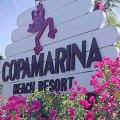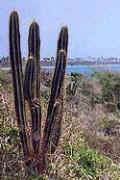| 作者 凱特•拉薩歐夫
關尼卡-波多黎各,2000-12-29 (ENS)
位於波多黎各-關尼卡「海洋伴侶濱海休閒旅館」的老闆,與經營本旅館的企業之一,對排放污水進入加勒比海域此嚴重違反淨水法案(Clean Water Act)之罪名認罪。
這間旅館的廢水系統,排放未經處理的生活廢水至加勒比海的卡拿各答海灘,至少8年以上。
「海洋伴侶濱海休閒旅館」在1997年裝設新廢水處理系統前,至少已排放未經處理的廢水至加勒比海達8年以上。(照片提供:海洋伴侶海濱休閒旅館)
經營「海洋伴侶濱海休閒旅館」之一的孔丘企業大股東兼總裁─亞諾•班奈斯,對未經許可、蓄意排放未經許可的生活廢水到加勒比海的嚴重指控認罪,孔丘企業也對其他三項類似指控認了罪。
在被告與美國環保署兩造達成的認罪協議條文中,班奈斯將面對3年緩刑、6個月的在家服刑(home detention譯註1)、及美金13萬罰鍰的處罰;(譯註1:因輕罪或監獄不夠的變通方式因國而異,有的要帶配有無線電發射器的腳環,以便監管,台灣並無對應的刑罰。)
孔丘企業則可能被判三年緩刑及總罰鍰美金三十萬的處罰。本案預定於2001年4月2日宣判。
司法務部環境與自然資源處的助理檢察官羅易斯•許佛表示:「遭環保署發覺它們的犯行後,被告依民法必須立即停止排放廢水,和污染行為的民事賠償。進一步調查更發現被告故意違規排放,且早已被警告它們這行為的違法。」
關西亞位於波多黎各南岸,這張空照圖顯示該島嶼的西半側。(照片提供:NASA)
許佛認為:「這次起訴應該傳遞了一個相當強烈的訊息,那就是蓄意污染波多黎各美麗水域的人,將面臨民事及刑事處罰。」
這家休閒旅館位於關尼卡旱林附近─獨特亞熱帶林地,已被聯合國科教文組織選定為國際生物圈保留區。(譯註2:廣義的生物圈指地球和生活其上的所有生物;狹義的是指某些生態系統內形成食物鏈的一群生物與其環境。)
關尼卡西方幾哩外,則是住著一群受擾動、便會發光照亮水域的螢光生物的著名淺灣─螢光海灣。壯觀的珊瑚礁就位在關尼卡和「海洋伴侶濱海休閒旅館」的岸邊。
規範美國水域各種污染物排放的淨水法案,是為了保護這些水域化學、生物等健全而制訂。藉由許可證照的發放來管理污染物排放量和無照排放非法行為。
關尼卡旱林是世界上保育得最好的亞熱帶林。(照片提供:海洋伴侶沙灘休閒旅館)
「海洋伴侶濱海休閒旅館」從1992年4月開始,污水處理設備便直接排放廢水至卡拿各答海灘。在1993年到1996年間,波國環境品質委員會,曾數度發現它無照直接排廢水入海。
環境品質委員會曾通知班奈斯和孔丘企業他們的違法行為,並要求他們停止排放。被告據聞曾考慮改裝污水處理系統至零排放系統。
然而在尋求新系統的同時,被告並未改進處理系統,未停止排放,也未申請排放許可證。
1997年8月,環保署的聯邦調查員發現「海洋伴侶濱海休閒旅館」仍將生活廢水直接排入海中,而廢水中含有高量的大腸菌。
在1997年8月21日對旅館進行染色法搜證,證實了該旅館的廢水處理系統直接排放廢水入海。
有些加勒比海域最美的珊瑚礁就在關尼卡沿岸。(照片提供:美國地理測量局)
環保署在證據確鑿後,對該休閒旅館和經營者提出民事訴訟,而旅館則在1997年9月停止排放,改用新的零排放系統。
2000年10月時,環保署與班奈斯、孔丘企業、旅館經理沙瓦多蘇奧、和經營旅館的薩波企業就此案達成和解。
依和解內容,被告將付給美國美金20萬元的民事賠償,而且除獲得許可,將永久禁止「海洋伴侶濱海休閒旅館」進行任何種類的污染物排放。
全文與圖片詳見: http://ens.lycos.com/ens/dec2000/2000L-12-29-06.html
版權歸屬Environment News Service(ENS),環境信託基金會(林以楠 譯、蘇崧棱 蔡麗伶 審校)
中英對照譯稿請見:http://news.ngo.org.tw/issue/
surround/2001/issue-surround01030101.htm
|
|
By Cat Lazaroff
GUANICA, Puerto Rico, December 29, 2000 (ENS)
The owner of the Copamarina Beach Resort in Guanica, Puerto Rico, and one of the corporations that operated the hotel, have pled guilty to felony violations of the Clean Water Act for discharging sewage into the Caribbean Sea.
For at least eight years, the hotel discharged raw domestic sewage into the Caribbean Sea at
Cana Gorda Beach through a pipe that stretched from the hotel's wastewater treatment plant directly into the sea.

The Copamarina Beach Resort sent raw sewage into the Caribbean Sea for at least eight years until it installed a new treatment system in 1997 (Two photos courtesy Copamarina Beach Resort)
Arnold Benus, the president and majority shareholder of the Concho Coporation, one of the corporations that operated the Copamarina Beach Resort, pled guilty to a felony count of knowingly discharging domestic sewage into the Caribbean Sea without a permit. Concho Corporation pled guilty to three similar felony counts.
Under the terms of a plea agreement reached between the defendants and the U.S. Environmental Protection Agency (EPA), Benus faces a sentence of three years probation with six months home detention and a fine of $130,000.
Concho Corporation faces a sentence of three years probation and a total fine of $300,000. Sentencing is scheduled for April 2, 2001.
"Upon discovery of their conduct by the EPA, the defendants faced civil action to bring their discharges to an immediate halt and were required to pay a civil penalty for their pollution," said Lois Schiffer, assistant attorney general at the Justice Department's environment and natural resources division. "Further investigation uncovered that the discharges were knowing and that the defendants had received prior warning about the illegal nature of their conduct."

Guanica lies on the southern coast Puerto Rico - this view from space shows the island's western half (Photo courtesy National Aeronautic and Space Administration)
"This prosecution should send a strong message that whoever knowingly pollutes Puerto Rico's beautiful waters may face both civil and criminal penalties for their conduct," Schiffer concluded.
The resort is located near the Guanica Dry Forest, a unique subtropical forest that has been designated an international biosphere reserve by the United Nations Educational Scientific and Cultural Organization (UNESCO).
A few miles west of Guanica is the Phosphorescent Bay, a renowned shallow bay inhabited by bioluminescent organisms that light the water when disturbed by movement. Spectacular coral reefs lie just offshore of Guanica and the Copamarina Beach Resort.
The Clean Water Act, which regulates the discharge of pollutants into U.S. waters, was enacted to protect the chemical, physiological and biological integrity of those waters. Permits are issued to regulate permissible amounts of pollutants, and the discharge of any pollutant without a permit is illegal under the Act.

The Guanica Dry Forest is the best preserved subtropical forest in the world (Photo courtesy Copamarina Beach Resort)
The Copamarina Beach Resort had been operating its wastewater treatment plant with a direct discharge into the
Cana Gorda Beach area since at least April of 1992. On several occasions between 1993 and 1996, the Environmental Quality Board of Puerto Rico (EQB) inspected the plant and found that it was discharging directly into the sea without required permits.
The EQB notified Benus and the Concho Corporation about these violations, and requested that they stop the discharges. The defendants reportedly considered changing the wastewater treatment system to a "zero discharge" system.
However, while looking into a newer system, the defendants did not upgrade the system or halt the discharges, and they did not apply for required permits.
In August 1997, federal agents from the EPA observed that the Copamarina Beach Resort was still discharging domestic sewage directly into the sea. Samples of the discharges were found to contain high levels of fecal coliform bacteria.
A criminal search warrant was executed on August 21, 1997. Dye testing of the wastewater treatment system confirmed that the hotel was sending its sewage into the ocean.

Some of the Caribbean's finest coral reefs lie off the coast from Guanica (Photo courtesy U.S. Geological Survey)
EPA filed a civil suit against the resort and its operators immediately after the dye testing, and in September 1997, the resort finally stopped the discharges and began using a new zero discharge system.
In October 2000, a consent decree was filed to settle charges against Bemus, Concho Corporation, resort general manager Salvador Suau and the Sapo Corporation, which manages the Copamarina Beach Resort.
Under the agreement, the defendants will pay a civil penalty of $200,000 to the U.S. and will be permanently barred from discharging any pollutants from any sources at the Copamarina Beach Resort, unless the required Clean Water Act permits are obtained.
http://ens.lycos.com/ens/dec2000/2000L-12-29-06.html
|
